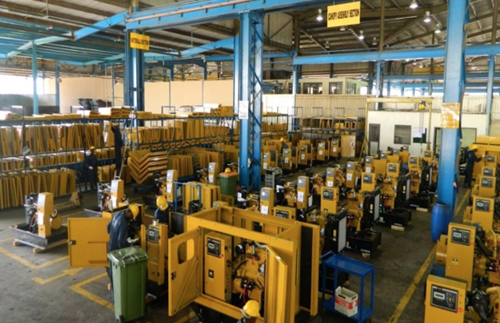Across Mantrac’s global operations, we have seen how different branches of the company have supported the care and relief efforts for those at risk in our communities. At the same time Mantrac also needs to take action to protect our staff, and the facilities they work in, from the commercial and economic impacts of the pandemic.
The COVID-19 challenges
In Nigeria, Mantrac’s CKD factory is a specialised facility for large-scale assembly and Manufacture of industrial generators. A large amount of Mantrac’s generator work is done at this facility, with the rest undertaken at smaller or more generalised facilities in other countries. If the factory were to close it would result in a loss of both employment and revenue.
Coronavirus cases in Nigeria began appearing at the end of February 2020. Cases continued to grow throughout March and by the end of the month major cities had been placed under lockdown. Many state Governments enacted similar restrictions for citizens and businesses.
Nigeria’s response to the pandemic has not been without its challenges. Primary amongst these are limited access to testing laboratories (leading to under-testing) and an inability to create economic stimuli to boost medical and social support for the vast majority of citizens.
This leaves Nigeria more susceptible to upsurges in infection rates as people have to travel to find care facilities which then become crowded, but also they continue to attend work against government advice because they cannot afford to be out of work.
Creating Security
As the lockdown came into force, two questions of security came into place. The employment security of workers and the physical security of the factory. In order to do this, the Nigeria Management committee had to create a lockdown contingency plan to focus on how employees and the business would be sustained through this period, however long it might end up being.
Where possible, Mantrac identified workers that could continue to work at the factory. A list of 100 workers was created. To ensure their safety, arrangements were made for them to stay in accommodation near the factory. This meant they could continue to work with a greatly reduced risk of infection. Meals were also provided for these workers along with other considerations.
With any large-scale social change there is the possibility that people will behave differently too. Across Nigeria there was concern for how people would react to the closing of large parts of the economy.

Securing the factory from external attention was considered a sensible precaution. To do so required extra staff on site and the altering of rotations. Alongside greater allowances, security shift cycles were changed to include 24-hour rotations, 7 days a week. Being onsite for longer periods also required support in the form of meals and provisions. This had the effect of increasing security presence at the factory, while also keeping the exposure risk low for those security workers.
Togetherness
Ahmed Ragab, Managing Director at Mantrac Nigeria said, “Throughout the lockdown we have worked to ensure that, as well as our communities, our people are protected. This means new, safer ways of working at the factory but also providing support outside the workplace to protect workers and their families.”
“The work of CKD factory manager Ayman EL Gewely and his team, along with Procurement Supervisor Olanrewaju Bamidele and her team, has been crucial in creating working models for revised operations. Instead of resisting change, they managed those changes, working together to find ways to make things happen.”
“This pandemic has changed our lives and our day-to-day norms in lots of ways, some that we have foreseen and some that we have had to react to with little warning. In each of these instances we have achieved the best results when we have worked together to keep each other safe and to ensure Mantrac continues to serve and support their customers in the most difficult of circumstances.”